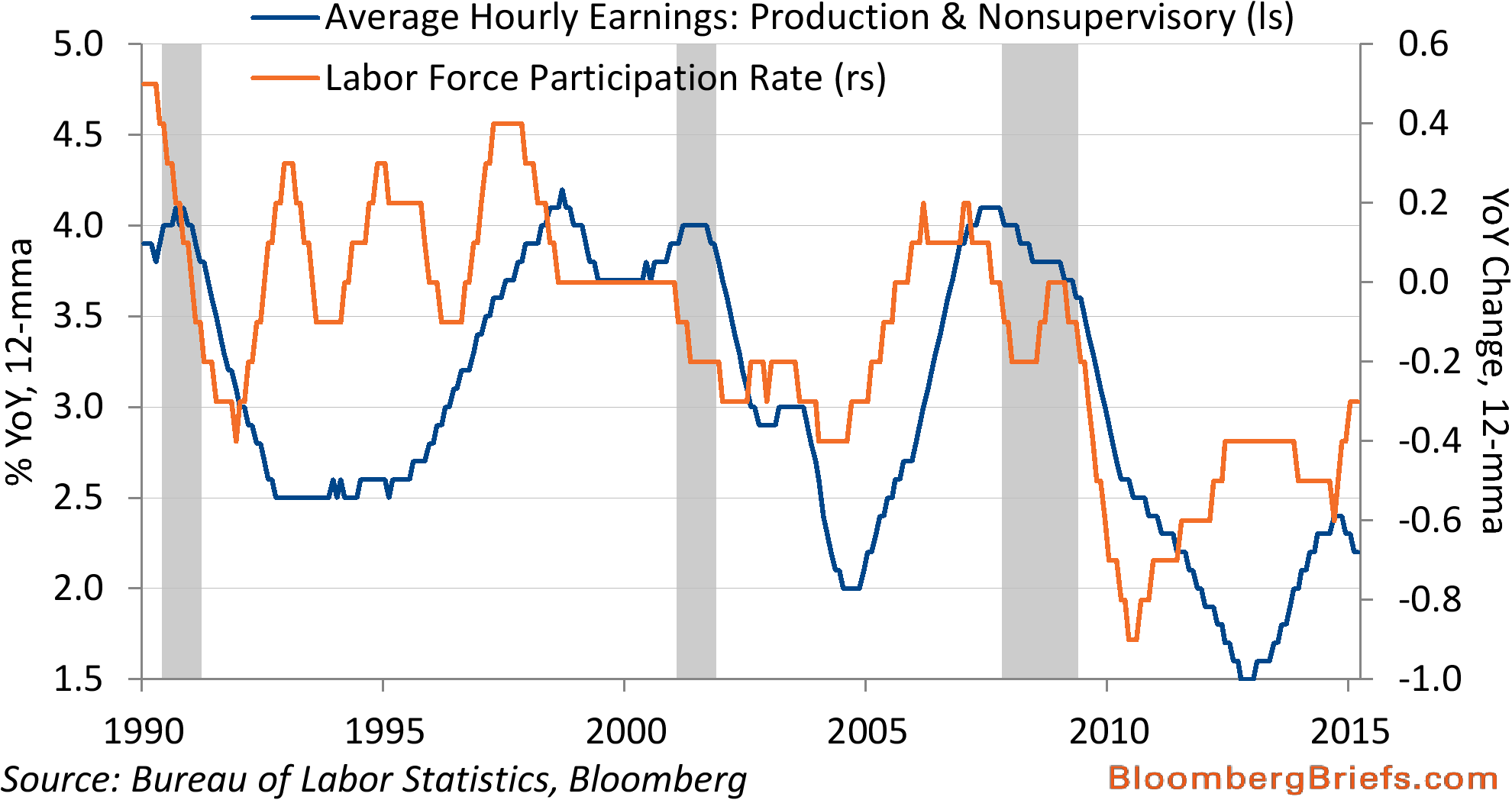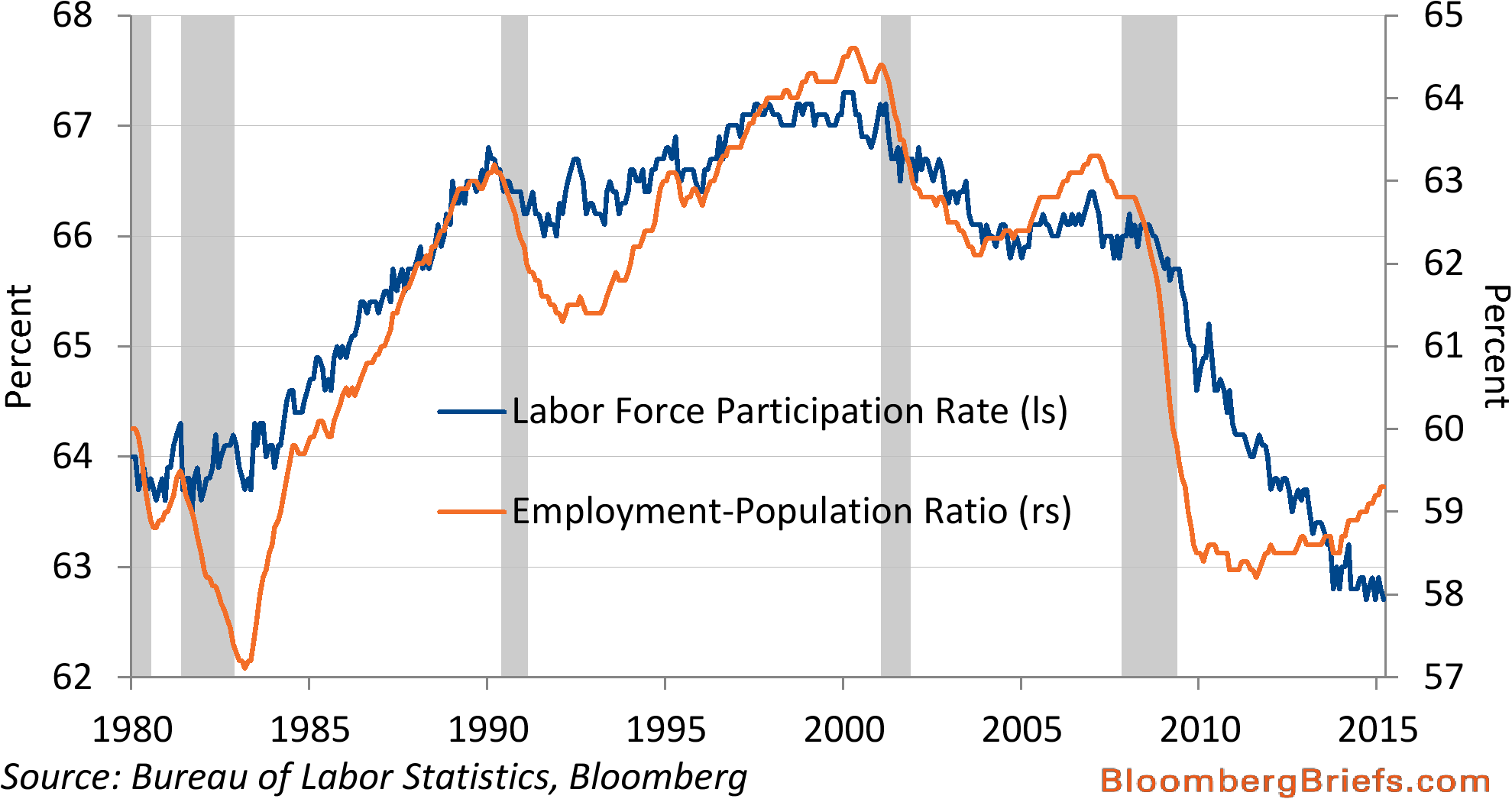Marginal Participants Await Higher Wages

Very interesting analysis on the Not in Labor Force cohort from Bloomberg Briefs:
In an economic cycle which has consistently been sluggish — from the overall pace of growth to wage pressures to inflation — the decline in the unemployment rate in the past several years has been truly impressive. Still, falling participation and rising wage inflation may be the more pressing labor trends for policy makers to watch.
After peaking at 10 percent in late 2009, the unemployment rate began a downtrend that has accelerated as the economy approaches full employment. As of March, the jobless rate was 5.5 percent, or 1.1 percentage points lower than a year ago. Barring the past few years, this pace of improvement has not been witnessed since the economy surged out of the deep recession of 1981-82, which was also the last time unemployment rose above 10 percent. In that period, real GDP grew in the vicinity of 8 percent, almost triple the current pace of 2.7 percent (both measures are the year-on-year percentage change of the four-quarter moving average).
The current decline in unemployment is much less impressive because of the concurrent fall in labor force participation (the sum of those who are employed or actively seeking employment as a share of the population). If potential workers become frustrated with the job search and stop actively looking, unemployment can fall for the wrong reasons as the participation rate also drops. This overstates the degree of improvement in the labor market. As a result, the trajectory of the participation rate will materially affect how policy makers interpret the unemployment rate’s approach toward 5 percent.
* snip *
The rest is at Bloomberg Briefs (subscription)



In the last month, we have had two people in our office announce their retirement. They are around 61-62 years of age so are in the peak of the Baby Boom demographic bulge. Both of them want to do other things instead of work while they are still healthy. I assume that their age would put them in the “labor force” but they are voluntarily leaving it. I suspect some of this is at the core of the reduction of the labor participation rate. I don’t expect the labor participation rate to perk up until the bulk of the baby boomers move out of the labor force statistic.
They have been participating in 401ks with decent matching from the employer for quite a while. They are also married with a spouse with a long employment record, so they will both get Social Security on their own records down the road as well as being able to tap into retirement savings. I expect that they will have median household income or more during retirement.
Would suggest to you these people are making a big mistake. They are likely to outlive their savings especially should they go on the “binge” of doing things. Worse longevity will cost them more in the 80’s(age) as these savings are needed just to live.
Neither are into a lot of material possessions. One of the nice things about the area we live in is that the basic cost of living is low. A median household income can easily afford a median house price with 5% down payment. So it is up to them to figure out whether or not early freedom to do things is worth a bit of a reduction in future income. Neither will be poor.
Anecdotal at best. What makes you think all Baby Boomers have the luxury of retiring early? Not everyone have 401k’s or an employer that decently match. And there are plenty of 401k’s that don’t do that well.
Participation rate assumes everyone is employable in current conditions and this is not the case. One reason is companies don’t train as they view every employee as a widget. Use them up and out. Then you’re own your own.Two add in the deliberate devaluing of education my the political and capital classes and you’ve only bodies.
Despite the allure of the participating economy the number of people in America capable of being the petite bourgeoisie is relatively small. They don’t have the capital to really accomplish anything. For example, Airbnb means you actually own something to really win and somewhere to go during the periods of highest demands. Here in Philadelphia the Pope’s visit is creating a frenzy for housing. Where do you go if you rent out your property, your dream vacation paid by Airbnb? I doubt it
Employment to population increase may be from: boomers staying past 66, due to lost net worth or missed savings, population over 66 needing to get back to work to make ends meet.
Could be SS elderly are taking jobs that working aged people find “discouraging”.
If you only have to do for a while………
Nice Baby Boomer driven head and shoulders on the graph.